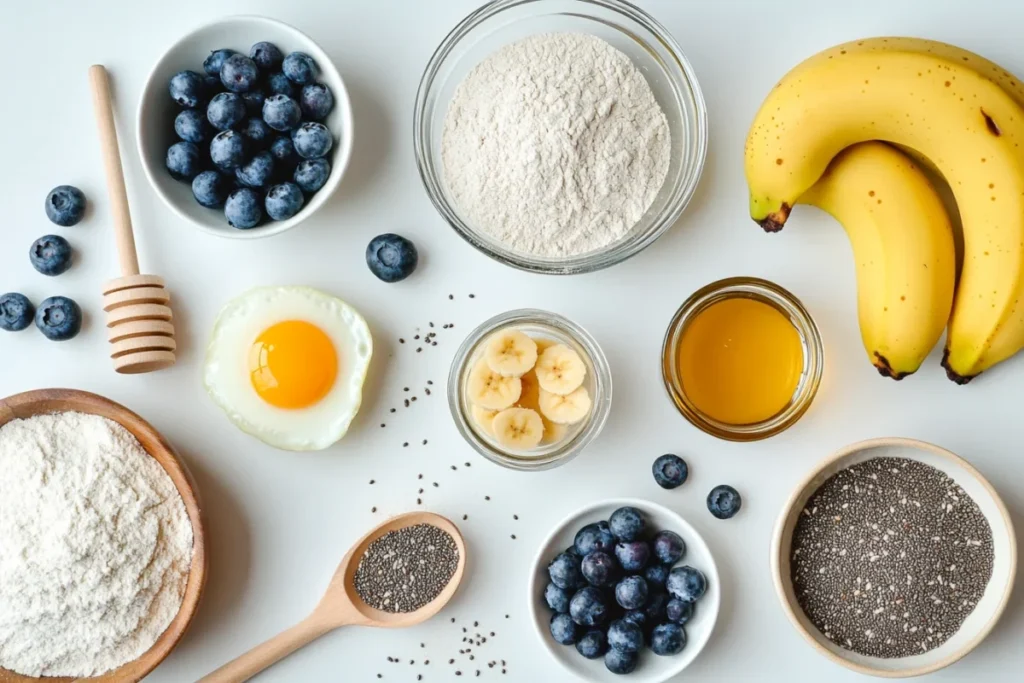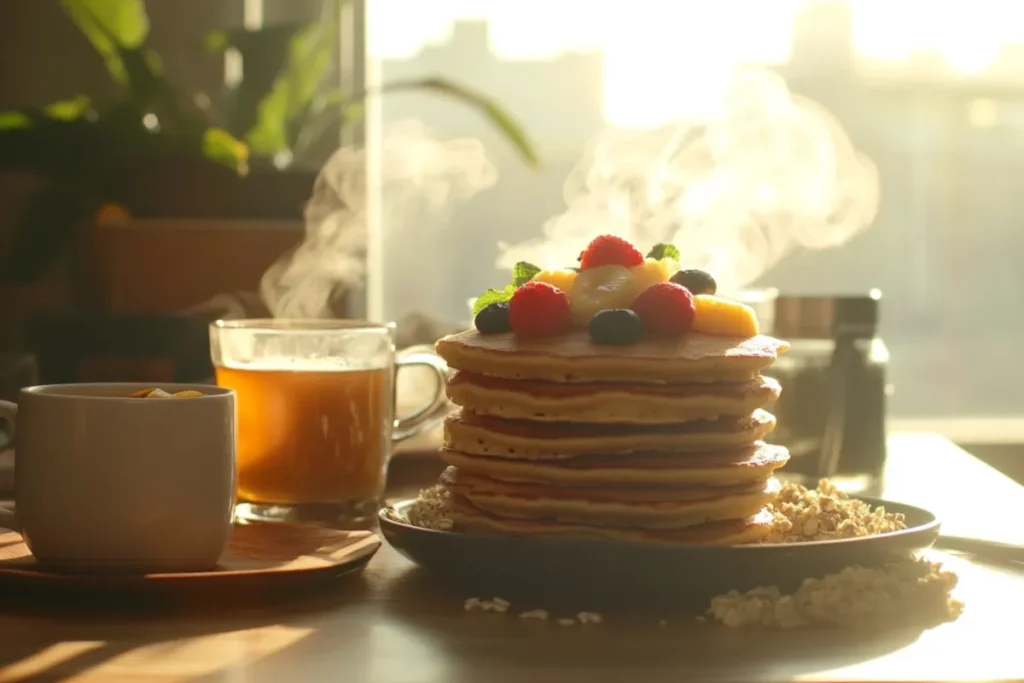Introduction
Who doesn’t love the smell of pancakes in the morning? These warm, golden, slightly sweet treats have been a favorite breakfast choice for years. But is it OK to have pancakes for breakfast? While they’re delicious and comforting, many wonder if they’re a healthy way to start the day. In this article, we’ll explore the benefits and drawbacks of eating pancakes in the morning, share tips to make them healthier, and suggest alternative breakfast options for a balanced diet.
Is It OK to Have Pancakes for Breakfast?
The Popularity of Pancakes as a Breakfast Choice
Pancakes are a favorite because they’re so versatile and easy to make. Whether you enjoy them plain, drizzled with syrup, or topped with fruit, they’re a hearty way to start the day. Around the world, people love different versions of pancakes, like crepes, blini, or fluffy American-style ones. Plus, pancakes are quick and simple to prepare, making them perfect for busy mornings.
Still, many wonder if pancakes are healthy. They’re often seen as a treat because of rich toppings like syrup and butter, which can add extra calories and make them less nutritious.
Nutritional Overview of Pancakes
Pancakes are usually made with flour, eggs, milk, and baking powder, which means they’re mostly carbohydrates. While they give you quick energy, traditional pancakes might not have all the nutrients you need for a healthy meal. Here’s what you should know:
- Calories: Two medium-sized pancakes have about 150–200 calories, not counting toppings. Add syrup and butter, and that number can double.
- Macronutrients: Pancakes are high in carbs but often low in protein and fiber, which are important for keeping you full and energized.
- Micronutrients: Basic pancake recipes don’t provide many vitamins or minerals, but adding fruits or fortified ingredients can help.
So, is it OK to have pancakes for breakfast? The answer depends on how you make them and what you eat with them. With a few changes, pancakes can be part of a healthy and balanced diet.
Nutritional Analysis of Pancakes
Macronutrient Composition
Pancakes are typically rich in carbohydrates, providing a quick energy source. However, the balance of macronutrients is key to determining whether they are a suitable breakfast option.
- Carbohydrates and Sugars
Traditional pancakes, made from refined white flour, are high in carbohydrates but often low in dietary fiber. This lack of fiber can lead to quick spikes in blood sugar levels, leaving you feeling sluggish later. Moreover, the addition of sugary syrups or chocolate chips can increase sugar content exponentially, turning breakfast into a dessert-like meal.Consider swapping refined flour for whole-grain or oat flour to boost fiber content. This simple change not only slows sugar absorption but also keeps you feeling full for longer. - Proteins and Fats
Pancakes alone are not a strong source of protein, which is essential for muscle repair and satiety. Adding protein-rich ingredients like Greek yogurt, cottage cheese, or protein powder to your batter can remedy this. Similarly, pancakes often contain small amounts of fat from ingredients like butter or milk. However, these fats are typically saturated fats, which should be consumed in moderation. Switching to healthier fats like avocado oil or using almond milk can make your breakfast more heart-friendly.
Micronutrient Content
Pancakes aren’t typically a powerhouse of vitamins and minerals unless you get creative with your ingredients. Let’s dive into what they bring to the table and how to enhance their profile.
- Vitamins
Traditional pancakes offer minimal vitamins. However, incorporating ingredients like pumpkin puree, spinach, or mashed bananas can naturally increase their vitamin A, C, and B6 content. You’re not only adding flavor but also sneaking in important nutrients. - Minerals
The basic pancake recipe contains small amounts of calcium and iron, especially if milk and eggs are used. To boost the mineral content, consider adding chia seeds, flaxseeds, or a handful of nuts to the batter. These additions enhance the flavor and improve the overall nutritional value.
By understanding the nutritional breakdown of pancakes, it’s clear they aren’t inherently “bad” or “good.” With a few tweaks, you can turn this breakfast favorite into a wholesome meal that aligns with your dietary goals.
Health Implications of Eating Pancakes for Breakfast
Impact on Blood Sugar Levels
One of the primary concerns with traditional pancakes is their potential to cause blood sugar spikes. Made predominantly from refined flour and topped with sugary syrups, they create a high-glycemic load meal. This can lead to:
- Quick Energy Crashes: After the initial energy boost, a rapid decline in blood sugar may leave you feeling tired or sluggish.
- Increased Hunger: Such dips often lead to mid-morning hunger pangs, tempting you to snack on unhealthy options.
To counter this, you can reduce the glycemic impact by choosing whole-grain flours, which digest more slowly. Adding fiber-rich ingredients like flaxseeds or chia seeds can also stabilize blood sugar levels.
Satiety and Energy Levels
Traditional pancakes, though satisfying in the moment, may not keep you full for long due to their low protein and fiber content. This lack of satiety often results in overeating or a heavier reliance on snacks before lunch.
- Balanced Energy: By incorporating protein sources like eggs, Greek yogurt, or a side of nuts, you can prolong the feeling of fullness.
- Sustained Energy: Including healthy fats—like a dollop of almond butter or a topping of avocado—can provide slow-burning energy, perfect for fueling your morning.
Potential Weight Gain
When consumed regularly without mindful preparation, pancakes can contribute to weight gain. High-calorie toppings such as whipped cream, syrups, or butter add significant amounts of unnecessary calories. Additionally, the refined carbs in pancakes don’t provide the same metabolic benefits as complex carbs.
To enjoy pancakes without the guilt, portion control and mindful ingredient choices are essential. Opt for nutrient-dense toppings like fresh fruit, unsweetened nut butter, or a drizzle of honey instead of syrup.
Key Takeaway: While pancakes have their health drawbacks, mindful ingredient swaps and moderation can help mitigate potential issues. When prepared with balanced nutrition in mind, pancakes can be part of a wholesome breakfast that sustains energy and promotes well-being.
Making Pancakes Healthier

Choosing Whole Grain Flours
Swapping out refined white flour for whole-grain alternatives is one of the easiest ways to make pancakes healthier. Whole-grain flours, such as oat flour, buckwheat flour, or whole wheat flour, are rich in dietary fiber and essential nutrients. These options:
- Enhance Satiety: The fiber content helps you feel full longer.
- Provide Steady Energy: Complex carbohydrates digest slowly, preventing blood sugar spikes.
- Add Nutritional Value: Whole grains are loaded with vitamins, minerals, and antioxidants.
Experiment with different flours or even mix a few for unique textures and flavors in your pancakes.
Reducing Added Sugars
Store-bought pancake mixes and traditional recipes often contain hidden sugars. To reduce your intake:
- Sweeten Naturally: Use mashed bananas, unsweetened applesauce, or a touch of honey in the batter for natural sweetness.
- Go Easy on the Toppings: Skip the maple syrup and whipped cream. Instead, try fresh berries, which add a burst of flavor and are naturally sweet.
- Flavor Boosters: Cinnamon, vanilla extract, or nutmeg can enhance the taste without adding extra sugar.
Incorporating Protein-Rich Ingredients
Protein is essential for a balanced breakfast, but traditional pancakes often fall short in this department. Consider these high-protein add-ins:
- Greek Yogurt or Cottage Cheese: Blend them into the batter for a creamy texture and protein boost.
- Protein Powders: Choose unflavored or vanilla-flavored powders to mix with the dry ingredients.
- Egg Whites: Adding extra egg whites increases the protein content without changing the taste.
Protein not only supports muscle health but also helps keep hunger at bay throughout the morning.
Adding Fruits and Vegetables
Sneaking fruits and vegetables into your pancake batter is a brilliant way to add nutrients and natural flavors:
- Fruits: Blueberries, raspberries, or grated apples provide vitamins and antioxidants.
- Vegetables: Try pureed pumpkin, zucchini, or carrots for a subtle sweetness and a boost of fiber.
- Top It Off: Fresh fruit as a topping not only adds sweetness but also ensures your breakfast is packed with vitamins and minerals.
Making pancakes healthier doesn’t mean sacrificing flavor. With thoughtful substitutions and creative additions, your breakfast can be both indulgent and nutritious—a win-win for your taste buds and your health!
Alternative Breakfast Options
High-Protein Breakfast Choices
If you’re aiming for a nutrient-packed start to your day, there are plenty of high-protein alternatives to pancakes that can fuel your morning.
- Egg-Based Dishes: Classic scrambled eggs, omelets with vegetables, or hard-boiled eggs provide high-quality protein and healthy fats.
- Greek Yogurt Bowls: Top plain Greek yogurt with fresh fruit, nuts, and a drizzle of honey for a balanced, high-protein option.
- Smoothies: Blend a mix of protein powder, almond milk, spinach, and frozen berries for a delicious breakfast shake.
These alternatives ensure that you stay full longer and avoid the mid-morning energy crash associated with low-protein meals.
Whole Grain Breakfast Foods
For those who love the texture of pancakes but want a healthier twist, whole-grain breakfast foods are a fantastic option.
- Overnight Oats: Combine oats with almond milk, chia seeds, and your favorite fruits. Let it sit overnight for a grab-and-go breakfast.
- Quinoa Bowls: A savory quinoa bowl with avocado, cherry tomatoes, and a poached egg is both filling and nutritious.
- Whole-Grain Toast: Pair it with nut butter, avocado, or a soft-boiled egg for a wholesome breakfast that’s quick to prepare.
Whole grains provide sustained energy and essential nutrients, making them a perfect choice for starting your day on the right foot.

Including these breakfast alternatives in your routine doesn’t mean giving up pancakes entirely. Rather, it’s about diversifying your meals and ensuring you get the variety and nutrients your body needs to thrive.
Frequently Asked Questions
Are pancakes a healthy breakfast option?
Pancakes can be a healthy breakfast option, but it depends on how they’re prepared. Traditional recipes made with refined flour and sugary toppings can lack essential nutrients and lead to blood sugar spikes. By opting for whole-grain flours, protein-rich add-ins, and fresh fruit toppings, you can enjoy pancakes as part of a balanced diet.
How can I make my pancakes healthier?
Making pancakes healthier is simple with a few adjustments:
- Use whole-grain or alternative flours like almond or buckwheat flour.
- Incorporate natural sweeteners like mashed bananas instead of sugar.
- Add protein with Greek yogurt, protein powder, or extra eggs.
- Top with fresh fruits, nuts, or a drizzle of natural honey instead of syrup.
What are some healthy toppings for pancakes?
Healthy toppings can elevate your pancakes while keeping them nutritious. Some great options include:
- Fresh fruits like blueberries, strawberries, or sliced bananas.
- A dollop of Greek yogurt.
- Crushed nuts like almonds or walnuts.
- A sprinkle of chia seeds or flaxseeds for added fiber.
Can I eat pancakes if I have diabetes?
Yes, you can eat pancakes if you have diabetes, but you should modify the recipe. Use low-glycemic flours like almond or coconut flour and avoid sugary syrups. Opt for high-fiber and high-protein ingredients to stabilize blood sugar levels. Toppings like fresh berries or a light drizzle of unsweetened almond butter are ideal.
How often is it okay to have pancakes for breakfast?
Pancakes can be part of your breakfast routine, but moderation is key. Enjoy them 1-2 times a week and balance your other meals with nutrient-dense options like eggs, yogurt, or whole grains. Focus on making pancakes healthier by using nutrient-rich ingredients.
What are some alternatives to traditional pancakes?
If you’re looking for alternatives, consider:
- Protein pancakes made with almond flour and eggs.
- Oatmeal pancakes, which are higher in fiber.
- Sweet potato pancakes, offering a nutrient-dense and naturally sweet option.
- Banana pancakes with just eggs and bananas for a simple, two-ingredient recipe.
By addressing these common questions, you can better understand how pancakes fit into a healthy lifestyle and make informed choices for your breakfast.
Final Thoughts on Having Pancakes for Breakfast
Pancakes are more than just a breakfast favorite—they’re a cultural staple that brings comfort and joy to many. But when it comes to health, traditional pancakes aren’t always the most balanced option. The good news? With a few smart tweaks, you can enjoy this classic dish without compromising your health or wellness goals.
Opting for whole-grain flours, reducing added sugars, and incorporating protein-rich and nutrient-dense ingredients can transform pancakes into a breakfast that fuels your day. Furthermore, pairing pancakes with healthy toppings like fresh fruits, nuts, or yogurt adds both flavor and essential nutrients.
If pancakes don’t align with your dietary goals every day, diversifying your breakfast with high-protein options or whole-grain dishes ensures a well-rounded start to your mornings. From overnight oats to savory quinoa bowls, there are plenty of alternatives to suit every palate.
Ultimately, the question “Is it OK to have pancakes for breakfast?” depends on preparation and moderation. With mindful choices, pancakes can absolutely be part of a healthy and enjoyable morning routine. So go ahead, flip those pancakes, and savor a delicious start to your day—with a healthier twist!
Conclusion
Pancakes are undeniably a beloved breakfast choice that has stood the test of time. While they’re often seen as a less nutritious option due to their traditional ingredients and sugary toppings, there’s plenty of room for improvement. By making thoughtful changes—such as using whole-grain flours, incorporating protein-rich elements, and topping them with nutrient-dense fruits—you can turn pancakes into a balanced and wholesome start to your day.
It’s entirely OK to enjoy pancakes for breakfast, especially when prepared with health in mind. Whether you indulge occasionally or make healthier versions part of your regular routine, the key is moderation and variety. Pair your pancakes with nutrient-dense alternatives on other mornings, and you’ll strike the perfect balance for a fulfilling and energizing breakfast lifestyle.
So, is it OK to have pancakes for breakfast? Absolutely—with the right tweaks, they can be a delightful and nourishing way to kick off your day!

